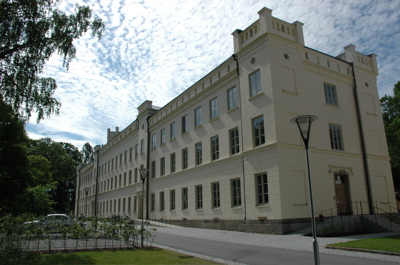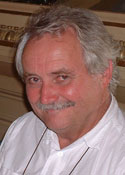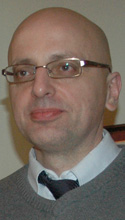SWEDISH SOUTH ASIAN STUDIES NETWORK
History of Religions, Faculty of Theology; Uppsala University:
 Postal
adress: Box 511, SE-751 20 Uppsala, Sweden
Postal
adress: Box 511, SE-751 20 Uppsala, Sweden
Visiting address: Engelska parken, Humanistiskt centrum, Thunbergsvägen 3 B
Web page: http://www.teol.uu.se/
Contact persons:
• Professor Peter
Schalk, Chair Professor of History of Religions, especially Hinduism
and Buddhism, phone: +46 (0)18 471 2293. Personal
web page.
• Associate Professor Eva
Hellman, phone: +46 (0)18 471 26 94.
South Asia related research at the department
• Eva Hellman is
especially focused on Modern Hinduism, and its relation to Politics as
well as Gender. She has done research on Political Hinduism, as well
as Hindu Goddesses and Women (in 1998 she published a book in Swedish
on this issue: ”Hinduiska gudinnor och kvinnor” (Bokförlaget
Nya Doxa).
 Later she has mainly been devoted to teaching South Asian religions at
her own department, as well as on the Master's
Programme in South Asian Studies at Uppsala University. She has also taught South Asian Religions at the School of Humanities and Media Studies, Högskolan
Dalarna, Campus Falun.
Later she has mainly been devoted to teaching South Asian religions at
her own department, as well as on the Master's
Programme in South Asian Studies at Uppsala University. She has also taught South Asian Religions at the School of Humanities and Media Studies, Högskolan
Dalarna, Campus Falun.
Dr. Hellman (photo to the right) has been involved in a research
project titled Gender
and religious activism in South Asia: A study of Christian, Hindu
and Muslim women’s organisations. The project
was carried out in collaboration with Dr Sidsel
Hansson, Centre for East and South-East
Asian Studies (ACE),
Lund University. It aimed at examining the role
of religion in a selection of women’s organisations in South Asia.
The project was given a planning grant from SASNET in the Spring 2001, and a
grant for continued networking in the Fall 2001. See the
full list of planning grants distributed by SASNET.

• Peter Schalk’s current main fields of research are: Buddhism/Hinduism, and religious expressions of social-economic conflicts in present South Asia, especially on the concepts of martyrdom in a cross-cultural perspective with focus on secular concepts as promoted by the Liberation Tigers of Tamil Ealam (LTTE). Earlier he has worked on Buddhist ritual in a Sinhala-Pali tradition, especially on pirit and bana, on Buddhism among speakers of Tamil in the pre-colonial period of South India and Lanka, on Caivam of Tamil speakers in the European exile, on the Väddo (Väddas) of Lanka, and on the semantic history of the toponym Ilam.
He has been engaged in Tamil Studies since the 1970s, and started his
field work in Sri Lanka in 1970. He witnessed the founding of Yalppanam
University in 1974, and has been closely connected to the exchange
programme between Uppsala University and the University of Yalppanam
(Jaffna) in Sri Lanka. This exchange programme was introduced in 1979
after the two VC’s of the two universities signed an agreement
of exchange. Due to the civil war the intensity decreased in the late
1990s, but it was again resumed after the ceasefire agreement in 2001.
Several researchers and also the chief librarian of Yalppanam University
have visited Uppsala since that.
In recent years Peter Schalk has worked
on the following South Asia related research projects:
– A comparative study of religious expressions in intra- and inter-state (martial) conflicts in South Asia and Southeast Asia, an interdisciplinary research project within the fields of Cultural Anthropology, Sociology, Development Studies, History and Comparative Religion (i e History of Religions). The overall aim of this project is to focus on the general socio-economic and political conditions leading to (martial) conflicts in South Asia and Southeast Asia in relation to religious values, value systems and ideologies, including their transformation and re-transformation in the course of the conflict and reconciliation.
– Friend or foe? European xenologies of South Asians. European colonial xenologies focused a very specific, fundamental and burning problem: How to cope with cultural diversity, including religions, and all its threatening implications? European arguments go deeper than to contingent impressions of liking or disliking another culture. They refer ultimately to a positively or negatively evaluating conceptualization of cultural diversity per se. Schalk proposes a seemingly very limited project to begin with, a project that focuses Swedish relations to colonial Dutch Ceylon in the 17th and 18th centuries. The language competence needed for this small area alone, colonial Ceylon, is Sanskrit, Pali, Prakrit, Sinhala and Tamil. Many sources used for this study, are in Portuguese, Dutch, and German. Already at the initial stage of this project, other European countries than Sweden are involved in this study.
– Memory, Ritual and Armed Resistance. Research project about how members of the LTTE through commemorative rituals are recruited and mobilised to commit suicidal acts. In November 2004 Schalk received SEK 478 000 SEK for this project as a two-years grant (2005–06) from the Swedish Research Council. More information (in Swedish only).
In January 2004 Schalk published a book called ”God
as Remover of Obstacles. A Study of Caiva Soteriology among Ilam Tamil
Refugees in Stockholm, Sweden” (Acta Universitatis Upsaliensis,
Historia Religionum 23. Uppsala: AUU, 2004). It is distributed through the
University Library Uppsala.
An International seminar on ”Precept and Practice
in Asian Buddhism” was held at Uppsala University 1–6 September
2004. Participants from China, UK, Sweden and above all Germany
were attending. The seminar was organised by Arbeitskreis für asiatische
Religionsgeschichte, Akar (Prof. Max Deeg, Dr. Oliver Freiberger and Dr. Christoph
Kleine, in co-operation with Uppsala University (Prof. Peter Schalk). The papers
presented will be published next year in Acta Universitatis Upsaliensis.
In August 2004 Peter Schalk received a SASNET Planning
grant for an educational project with Jaffna (Yalppanam) University, called ”Introduction
of Modern Research Methods and Theories within the field of humanities in the
University of Yalppanam.”
Dr. Schalk was, as mentioned above, connected to the University of Jaffna
(Yalppanam) from 1970, and involved in students and teachers exchange.
Due to the civil war in Sri Lanka Jaffna has however been cut off from
the outside World for many years, and this is especially the case regarding
studies in humanities. The planning grant was used by Schalk to spend
time at Jaffna University during the Winter 2004/05, to give courses
and lead seminars on all levels that initiate a change of the prevalent
weaknesses. He also prepared the ground for Swedish students to go to
Jaffna for language courses in Tamil and for studies in Shivaism.
The contacts at Yalppanam University has mainly been with the Dept. of Hindu
Civilization; Dept. of Islamic and Christian Studies; the Tamil Department (including
epigraphical Tamil); and the Dept. of History and Archaeology.
In December 2007, Prof. Schalk published a monograph titled ”Die Lehre der Befreiungstiger Tamililams von der Selbstvernichtung durch göttliche Askese: Vorlage der Quelle ÜBERLEGUNGEN DES ANFÜHRERS” about the nationalism/patriotism of Veluppillai Pirapakaran, leader of the LTTE, based on the collection of his sayings known as talaivarin cintanaikal 'Reflections of the Leader', and some of his speeches. The introduction is in German. It focuses on the concept of tiyakam 'abandonment (of life)', sometimes rendered as martyrdom or heroic death. Then follows the Tamil text but transliterated. Finally follow Schalk’s complete translations of this text into German, English, and Swedish. A translation into Sinhala is added, produced by Anonymous. The readers of Sinhala can now for the first time study the authentic words of Veluppillai Pirapakaran in their mother tongue. The work, financed by the Swedish Research Council (Vetenskapsrådet), has done in co-operation with professor Alvapillai Veluppillai. The manuscript was closed in September 2007. The work is published as e-book only and can be downloaded free of charge from the database at Uppsala University chapter by chapter. There are six. Please go to http://publications.uu.se/abstract.xsql?dbid=8404.
Alvapillai Veluppillai is Professor Emeritus in Tamil from the University of Yalppanam, Sri Lanka. During the period 1990-2000 he was connected to Uppsala University as a researcher on Tamil literature and religion, and he received an Honorary Doctorate there in 1995. He is now living in America.
In July 2010, Prof. Peter Schalk convened a panel on ”Confrontations in Sri Lankan politics. Origins and present developments” at the 21st European Conference on Modern South Asian Studies in Bonn, Germany. The panel focused on the radical changes observed in Sri Lanka during the last year, with more than hundred thousand refugees being caught in the armed struggle of the Sri Lankan armed forces and the LTTE. The LTTE suffered a military defeat but at the same time a resilient Tamil Diaspora in Canada, Australia and the EU demonstrated the LTTE's defiance. Scholars were invited to elaborate on and explain the radical changes and its consequences for the economic development and for the possibilities of reconciliation for peace. More information about the panel.
On 24 November 2010, Peter Schalk participated in a seminar on ”Sri Lanka after the War” in Lund. There he talked about ”Defeated but Defiant. The Ilamtamil Resistance Movement after May 2009”. The seminar was co-organised by SASNET and the Association of Foreign Affairs at Lund University (UPF). Venue for the seminar: Café Athen, Sandgatan 2, Lund. See the poster for the seminar.
In the Fall 2005 Dr Pushparatnam visited Uppsala University for six months. He is a professional archaeologist specialising on the Tamil area in South India and Ilam (Lanka), holding a senior lecturer’s post at Yalppanam University. His coming to Uppsala was part of the exchange programme between Uppsala and Yalppnam that started in 1989. In Uppsala, he is worked together also with the Dept. of Archaeology, where a team of young archaeologists from the island already works. The task of Dr Pushparatnam has been to document the earliest religious artefacts found by him during two decades of excavations in the Tamil area of Ilam. His work will be a contribution to our knowledge about the earliest forms of Tamil Caivam (Sivaism) and Tamil Pauttam (Buddhism) in Ilam.
• Amirtalinkam Cellaiya (Amirthalingam Selliah) defended his doctoral dissertation on ”Murukak katavul valipatu. A Study of the Worship of God Murukan in Malaiyakam on Ilam and in Tamilakam”, on 8 December 2003. He was supervised by Prof. Schalk. The faculty opponent was Professor S Pathmanathan from Peradeniya University, Sri Lanka. The thesis highlights the act of worship of Murukak katavul, as it is continuously practiced and developed as Tamil heritage in Sri Lanka, in a historical context of the European colonial plantation economic system on on one hand, and, in the context of traditional Sinhalese Theravada Buddhism, as well as Christianity, Islam, and, not least, the religion of Veddas – that is, the prevalence of a common myth of Murukan and Valli tradition among the earliest inhabitants of Ilankai – on the other. More information.
 From the Fall 2010, Dr. Ferdinando Sardella is working as a post-doc at the department. He came from the Department of Literature, History of Ideas, and Religion, Gothenburg University, where he defended his doctoral dissertation on ”Bhaktisiddhanta Sarasvati. The Context and Significance of a Modern Hindu Personalist” in February 2010. More information.
From the Fall 2010, Dr. Ferdinando Sardella is working as a post-doc at the department. He came from the Department of Literature, History of Ideas, and Religion, Gothenburg University, where he defended his doctoral dissertation on ”Bhaktisiddhanta Sarasvati. The Context and Significance of a Modern Hindu Personalist” in February 2010. More information.
The doctoral dissertation about the life and work of Bhaktisiddhanta Sarasvati is being prepared now for publication by Oxford University Press and will be published in spring 2012. ![]()
In June 2010, he was given the 2010 Donner Institute Award for Eminent Research in Religious and Cultural History. The Donner Institute is a private research institute under the auspices of the Foundation for Åbo Akademi University in Finland, and the award is given for Dr. Sardella’s doctoral thesis.
The award ceremony took place in Åbo (Turku) during an international conference entitled ”Religion and the Body”, organised by the Donner Institute (more information).
Dr. Sardella is also affiliated to the Department of Sociology at Jadavpur
University in Kolkata, under the supervision
of Professor Ruby Sain. (The
contact with Jadavpur University was mediated through the services of
Lars Eklund and Staffan Lindberg of SASNET during their academic tour
of South Asia in December 2005. Read
their report from meetings at Jadavpur University).
He
has also spent four months in spring 2008 at the
Oxford Centre for Hindu Studies through a scholarship by the Swedish
Foundation for International Cooperation in Research and Higher Education.
On 26 May 2011, Dr. Sardella was awarded a scholarship for two years by the Swedish Research Council to continue his work as a post-doc on a new research project on modern Hinduism and globalization. The project is entitled ”Hinduism and Globalisation: A Return Journey”. ![]()
Project abstract: India is set to become a leading political and economic power in the world, and its various ties with Sweden are becoming increasingly important. A key to successful East-West cooperation lies in European knowledge of the dynamics of Indian cultural and religious life, and in terms of this, Vaishnavism remains the leading religious culture of Hindu India. Interestingly, an important element of Vaishnava culture concerns the mutual influence of Indians and Europeans through the migration and transformation of religious movements. The primary purpose of this project is to explore through archive sources and interviews the growth of a modern Hindu movement in Sweden known as the Gaudiya Math with particular focus on Stockholm, where it is well represented, but insufficiently explored. A secondary purpose is to investigate the impact of the movement in the area in West Bengal as it returned there. The Gaudiya Math is an institution created in Bengal in 1918 by the revivalist Bhaktisiddhanta Sarasvati (1874-1934). Bhaktisiddhanta launched a mission to London in 1933, and since the 1970s global offshoots of the Gaudiya Math have reached Sweden among the Hindu diaspora and local populations. One of those movements is popularly known as the Hare Krishnas. The study of a Vaishnava movement is relevant for another reason. Modern Hinduism has almost universally being identified with monism (the oneness of ultimate reality and self), which has had a significant impact on the New Age movement. This outcome has obscured currents such as the Gaudiya Math that focus on the ultimate difference between god and self. The study contributes to a more balanced knowledge of global Hinduism's multiple forms.
SASNET - Swedish South Asian Studies Network/Lund
University
Address: Scheelevägen 15 D, SE-223 70 Lund, Sweden
Phone: +46 46 222 73 40
Webmaster: Lars Eklund
Last updated
2011-06-10
